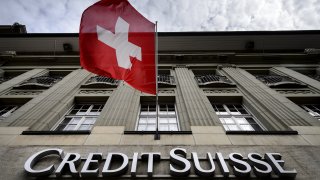
- Last week, Credit Suisse revealed that it was expecting heavy losses in the wake of the meltdown of U.S. hedge fund Archegos Capital.
- It took a charge of $4.7 billion as a result and now expects a first-quarter pre-tax loss of around $960.4 million.
- Investment Bank CEO Brian Chin and Chief Risk and Compliance Officer Lara Warner will step down from their roles with immediate effect.
Credit Suisse on Tuesday announced several high-level staff departures and proposed a cut to its dividend as it weighs heavy losses from the Archegos Capital saga.
The Swiss lender now expects a first-quarter pre-tax loss of around 900 million Swiss francs ($960.4 million), after taking a charge of 4.4 billion Swiss francs as a result of the scandal.
Get Tri-state area news and weather forecasts to your inbox. Sign up for NBC New York newsletters.
"The significant loss in our Prime Services business relating to the failure of a U.S.-based hedge fund is unacceptable," CEO Thomas Gottstein said in a trading update.
Investment Bank CEO Brian Chin and Chief Risk and Compliance Officer Lara Warner will step down from their roles with immediate effect, the bank said.
Last week, Credit Suisse revealed that it was expecting heavy losses in the wake of the meltdown of U.S. hedge fund Archegos Capital. The bank was forced to dump a significant amount of stock to sever its ties to the troubled family office.
Money Report
The executive board has also waived its bonuses for the 2020 financial year, the bank announced Tuesday, with Chairman Urs Rohner giving up his "chair fee" of 1.5 million Swiss francs.
At its AGM on April 30, Credit Suisse will now propose a dividend of 0.10 Swiss francs gross per share along with the amended compensation report.
"Particularly following the significant US-based hedge fund matter, the Board of Directors is amending its proposal on the distribution of dividends and withdrawing its proposals on variable compensation of the Executive Board," the Swiss lender said in a trading update.
It has suspended its share buyback program and said it does not intend to resume share purchases until it has regained its target capital ratios and restored its dividend.
Credit Suisse shares gained 1.7% by late morning trade in Europe.
Another scandal
Last month, the bank announced a shakeup of its asset management business and a suspension of bonuses as it looked to contain the damage from the collapse of British supply chain finance firm Greensill Capital.
The Board has launched two separate investigations, to be carried out by third parties, into the Greensill and Archegos sagas, vowing to "not only focus on the direct issues arising from each of them, but also reflect on the broader consequences and lessons learned."
Chin will be replaced at the helm of the investment bank on May 1 by Christian Meissner, currently Credit Suisse's co-head of international wealth management investment banking advisory and vice chairman of investment banking.
Joachim Oechslin has been appointed interim chief risk officer and Thomas Grotzer interim global head of compliance as of Tuesday. All three will report to CEO Gottstein.
"In combination with the recent issues around the supply chain finance funds, I recognize that these cases have caused significant concern amongst all our stakeholders. Together with the Board of Directors, we are fully committed to addressing these situations. Serious lessons will be learned," Gottstein said in a statement.
'More casualties'
Beat Wittmann, chairman and partner at Zurich-based Porta Advisors, told CNBC on Tuesday that while the Credit Suisse case does not represent a systemic crisis, there could be "more casualties" unless the root causes are addressed in the banking sector.
"The danger is always that we just focus on changing people but stick to the same business models, the same incentives, exploiting the same regulatory loopholes," Wittmann said.
"The worst thing of all, particularly in European investment banks, they are only able to employ the 'B-league' U.S. investment bankers, and the shareholders of course are paying the price for that."
Wittmann also argued that European investment banks had not adapted to safeguard themselves in the same way as their American counterparts in the wake of the 2008 global financial crisis.
"The European banks simply continued with their universal banking model and if this is not changed really at the root cause of the problem, we will see more casualties this year in Europe and much bigger ones. And then at some stage, we will see one which will be systemically relevant, and the regulators of course will then act."
He added that in the current environment of expansionary fiscal policy and loose monetary conditions, the risks of a systemic event are rising as risk assets continue to inflate.






